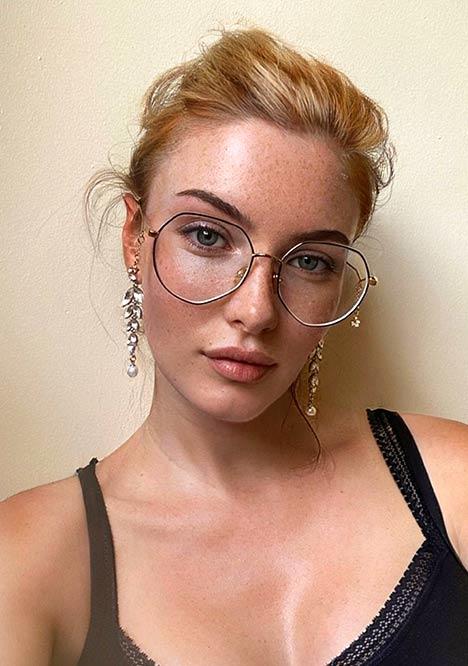How to choose the best contact lenses for dry eyes?
One of the top concerns when buying corrective lenses is your comfort, which is why choosing the best contact lenses for dry eyes is non-negotiable. Dry eye syndrome can affect anyone, more so if you choose to wear the wrong pair of contacts.
It's common for contact lens wearers to wonder whether there's a suitable pair for dry eyes. In the past, experts would avoid recommending contact lenses for people with this condition. They would rather encourage these wearers to buy eyeglasses instead. However, newer technologies made contacts designed for dry eyes available.
Before you shop around, here's a quick guide to choosing contact lenses that work well for dry eyes.

What causes dry eyes?
Several reasons contribute to dry eye syndrome, which occurs when your tear glands don't produce the usual amount of tears to lubricate the eyes. It also happens when tears evaporate more quickly than normal.
Often, people over 50 years old complain of dry eyes since tear production can decline with age. Also, some types of medication like anti-allergies, antidepressants, birth control, and anti-hypertension drugs can also lead to this condition.
Eye strain due to prolonged use of computers and other gadgets may also lead to dry eye syndrome. When you stare at the screen for too long, you tend to blink less, which causes tears to quickly evaporate.
Damage to your tear glands or the skin around the eyes can cause dry eyes. If you are facing hormonal changes due to menopause, you might also experience this symptom.
Is it good to wear contacts for dry eyes?
Prolonged wearing of contact lenses can cause dry eyes. You might have to deal with red, itchy, and irritated eyes if you wear contacts improperly. Contact lens-induced dry eye (CLDE) occurs when the lens material blocks oxygen from permeating the eye. Over time, the lens absorbs tears to maintain its shape, which dries the eyes consequently.
However, you don't have to give up wearing contacts even with this condition. You can now buy the best contact lenses for dry eyes in the right brand, material, and color that you prefer. There are several contacts made especially for dry eyes.
Soft contact lenses
Some eye care professionals recommend soft contact lenses for people with dry eyes. These lenses are typically made of silicone hydrogel, which is flexible and retains moisture for a long time. However, most soft lenses are designed for daily use only. It's ideal if you will switch between your favorite eyeglasses and contacts regularly.
Rigid Gas-Permeable (RGP) contact lenses
RGP or rigid gas permeable lens is another popular option for people with dry eyes. These contacts have a durable plastic material able to hold moisture very well. They also enable your eyes to "breathe" effectively since more oxygen passes through the material.
Scleral lenses
Scleral contacts are large-diameter RGP lenses that keep the front surface of your eyes from drying out. They are unique not only in size but also in the way they rest on the sclera or whites of your eyes. If you have an irregular corneal condition like keratoconus, scleral lenses may help you see sharper images than soft contacts.
How to choose the best contact lenses for dry eyes?
If you're hesitant to try out contact lenses because of dry eyes, you can consider these factors in choosing what to buy.
1. Oxygen permeability
When picking contact lenses, it's essential to choose a pair that has high oxygen diffusion. More oxygen to the eye means a healthier cornea, which improves comfort and prevents complications like dry eyes.
2. Water content
Contact lenses are partially made up of water but not every lens has the same water content. Lenses with water content below 50% are typically ideal for patients with dry eyes since they don't draw out water from your eyes. You can select contacts with around 40% water or less if you have dry eye syndrome.
3. Fit
Most people assume that only the prescription matters when selecting contact lenses. However, if you have dry eyes, choosing the right fit is just as important. Properly fitting lenses give you more comfort and prevent scarring or blurred vision.
4. Frequent replacement
When you wear contacts, the buildup of substances like protein on the eye is normal. All that gunk may cause irritation to your already-sensitive eyes. For this reason, it's worth considering daily disposable contacts to reduce the accumulation of such deposits on the lens.
Final thoughts
The best contact lenses for dry eyes are those that boast features to protect your eyes from further drying out. You can also alternate between contacts and eyeglasses occasionally.
Recommended articles:
Soft contact lenses vs. hard contact lenses explained
Eye care: 6 useful tips to relieve dry eye
Daily vs. monthly contact lenses: the better choice
Explained! why you shouldn’t sleep with contact lenses in
How to choose the best contact lenses for dry eyes?
How to find the best colored contact lenses?
Contact lenses vs. eyeglasses: what should you pick?
Scleral contact lenses' advantages and disadvantages



















